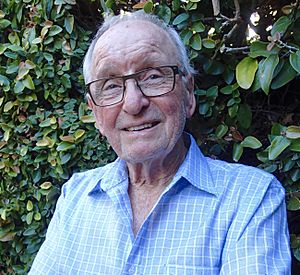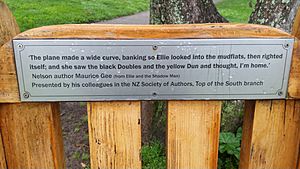Maurice Gee facts for kids
Quick facts for kids
Maurice Gee
|
|
|---|---|

Gee in 2018
|
|
| Born | Maurice Gough Gee 22 August 1931 Whakatāne, New Zealand |
| Died | 12 June 2025 (aged 93) Nelson, New Zealand |
| Occupation | Writer |
| Alma mater | University of Auckland |
| Notable works |
|
| Spouse |
Margareta Gee
(m. 1970) |
| Children | 3 |
Maurice Gough Gee (born August 22, 1931 – died June 12, 2025) was a famous New Zealand writer. He wrote more than thirty novels for both adults and children. Maurice Gee won many awards in New Zealand and other countries. These included top prizes at the New Zealand Book Awards. He also won the James Tait Black Memorial Prize in the UK.
His novel Plumb (1978) is considered one of the best novels ever written in New Zealand. He was also well-known for his books for young people. One of his most famous children's books is Under the Mountain (1979). He won several top awards for children's and young adult fiction. In 2002, he received the special Margaret Mahy Award. This award recognized his important contributions to children's literature. In 2003, he was named an "Icon" by the Arts Foundation of New Zealand. This meant he was one of New Zealand's greatest living artists.
Contents
Maurice Gee's Early Life and School
Maurice Gee was born in Whakatāne, New Zealand. He grew up in Henderson, a suburb of Auckland. This area often appeared in his stories. His mother, Harriet Lyndahl Gee, was a writer and a socialist. She even had a children's book published. His father, Leonard Gee, was a carpenter. Maurice was the middle of three sons.
His grandfather, James Chapple, was a minister. He later became the inspiration for a character in Gee's Plumb trilogy. Maurice Gee went to Henderson Primary School and Avondale College. He studied at the University of Auckland. The university later honored him for his achievements. He also received an honorary degree from Victoria University of Wellington.
Maurice Gee's Writing Career
Starting as a Writer: 1950 to 1977
Maurice Gee started writing while at university. His short stories were published in New Zealand magazines. After finishing his studies, he taught at a high school for about 18 months. But he left teaching in 1956 to focus on writing full-time. He received grants to help him with his writing.
His first novel, The Big Season, came out in 1962. It was about a rugby player. Gee himself was a keen rugby player. In 1964, he received the Robert Burns Fellowship. This is a very important writing award in New Zealand. During this time, he wrote his second novel, A Special Flower (1965). After that, he trained as a librarian. He worked in several libraries in the 1960s and 1970s.
His third novel, In My Father's Den, was a mystery story published in 1972. This book was later made into a movie in 2004. He then released a collection of short stories, A Glorious Morning, Comrade (1974). This book won an award at the 1976 New Zealand Book Awards. He also wrote another novel called Games of Choice (1976).
Famous Books and Children's Stories: 1978 to 1991
Maurice Gee's novel Plumb (1978) is his most famous book for adults. Many people think it is one of the best novels ever written in New Zealand. In 2018, experts voted it the best New Zealand novel of the past fifty years. Gee said it was his "grandfather novel." The main character, George Plumb, was based on his mother's father. The book won major awards in the UK and New Zealand.
Plumb was followed by two more books, Meg (1981) and Sole Survivor (1983). These books explore how history, politics, and religion affect a family. Meg also won a top prize at the New Zealand Book Awards.
Around this time, Gee also published his first children's novel. It was Under the Mountain (1979). This science fiction story is set in Auckland. It's about 11-year-old twins who find aliens under a volcano. The book is still popular today and is a New Zealand classic. It has been made into a TV show and a movie. In 2004, Under the Mountain won the Gaelyn Gordon Award. This award is for a much-loved children's book that didn't win awards when it first came out.
He wrote other children's books too. These included The Halfmen of O (1982), which won the AIM Children's Book Awards Book of the Year. Motherstone (1985) also won an award.
To earn more money, Gee started writing for television. He wrote for a soap opera and a police drama. Two of his children's books, The Fire-Raiser (1986) and The Champion (1989), started as TV projects. In 1987, he received another honorary degree. He also wrote two adult novels set in Nelson: Prowlers (1987) and The Burning Boy (1990). The Burning Boy won a top fiction prize in 1991.
Later Career and Impact: 1992 to 2025

Maurice Gee's tenth novel, Going West (1992), confirmed his place as one of New Zealand's best writers. This novel was very personal for Gee. The fictional town in the book was much like Henderson, where he grew up. The book inspired the Going West Books & Writers Festival in Auckland. This festival has been held every year since 1996. Going West won a top fiction prize in 1993. A British newspaper called Gee "one of the finest writers" in the English-speaking world.
In 1992, Gee received the Katherine Mansfield Menton Fellowship. This allowed him to work in France. While there, he wrote Crime Story, published in 1994. This book was later made into the 2004 film Fracture.
The Fat Man (1994) won the AIM Children's Book of the Year award. Gee called it a "psychological thriller for children." In 1998, he published Live Bodies for adults. This book won two top awards. Other notable children's books from this time included Orchard Street (1998) and Hostel Girl (1999). In 2002, he received the Margaret Mahy Award for his work in children's literature.
In the early 2000s, Gee continued to write. His novels included Ellie and the Shadow Man (2001) and The Scornful Moon (2003). He also received two major awards. In 2003, he was named an "Icon" by the Arts Foundation of New Zealand. In 2004, he received a Prime Minister's Award for Literary Achievement for fiction. His 2005 novel Blindsight won several awards. His 2007 novel Salt won an award for young adult fiction. Salt and its sequel, Gool, were both listed as notable young adult books. The third book in the series, The Limping Man (2010), was also a finalist for an award.
In 2015, a biography about Maurice Gee was published. In 2017, he published The Severed Land. This book won a top award for young adult fiction. In 2018, Gee published his memoir, Memory Pieces. He said it would likely be his last book. It was shortlisted for an award in 2019.
Writing Style and Themes
Maurice Gee's novels are usually set in New Zealand. Often, they take place in made-up versions of Henderson, where he grew up. His adult novels show real-life New Zealand. They often feature families with problems. His children's and young adult novels are usually fantasy or science fiction. Even in his children's books, his writing can have sad or difficult moments. His stories often show a rich picture of New Zealand life. They also explore human life in general.
Maurice Gee's Personal Life
Maurice Gee had a son, Nigel, born in 1959. He later married Margareta in 1970. They met at the Alexander Turnbull Library. They had two daughters, Abigail and Emily. Abigail is an animator, and Emily is also a writer. Gee said that meeting Margareta changed his life. He felt she brought stability to his life and helped him become a successful writer.
Maurice Gee lived in Nelson with his wife. He considered himself retired from writing. He believed in evolutionary humanism. He passed away in Nelson on June 12, 2025, at the age of 93.
Awards and Honours
- 1964: Robert Burns Fellowship at the University of Otago
- 1978: James Tait Black Memorial Prize for Plumb
- 1979: 1st Prize for Fiction at the Goodman Fielder Wattie Book Awards for Plumb
- 1979: Fiction Prize at the New Zealand Book Awards for Plumb
- 1983: AIM Children's Book Awards Book of the Year for The Halfmen of O
- 1986: Esther Glen Award for Motherstone
- 1987: Honorary Doctorate of Literature from Victoria University of Wellington
- 1992: Katherine Mansfield Menton Fellowship
- 1993: 1st Prize for Fiction at the Goodman Fielder Wattie Book Awards for Going West
- 1995: Esther Glen Award for The Fat Man
- 1995: AIM Children's Book Awards Book of the Year for The Fat Man
- 1998: Deutz Medal for fiction at the Montana New Zealand Book Awards for Live Bodies
- 2002: Margaret Mahy Award for important contributions to children's literature
- 2003: Named an Arts Foundation Icon
- 2004: Gaelyn Gordon Award for Under the Mountain
- 2004: $60,000 Prime Minister's Award for Literary Achievement for fiction
- 2004: Honorary Doctorate of Literature from the University of Auckland
- 2006: Deutz Medal for Fiction at the Montana New Zealand Book Awards for Blindsight
- 2008: New Zealand Post Young Adult Fiction Award for Salt
- 2017: New Zealand Book Awards for Children and Young Adults Copyright Licensing NZ Award for Young Adult Fiction for The Severed Land
Books Made into Films and TV Shows
- Fracture (2004) based on Crime Story
- In My Father's Den (2004)
- Under the Mountain (2009)
- Under the Mountain (1981) eight-part TV show
See also
- New Zealand literature

